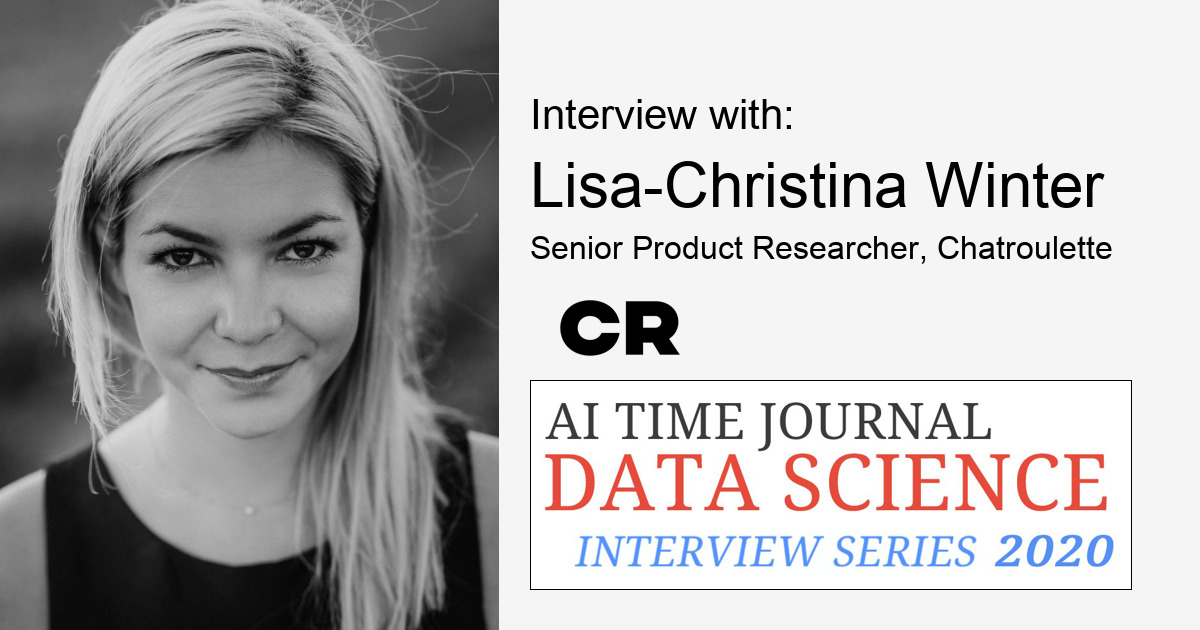
Lisa-Christina Winter is a data scientist, speaker, and AI article author. She has recently been nominated as one of the AI Time Journal inspiring data scientists to follow in 2020.
We thank Lisa-Christina for sharing several insights in this interview, including her reflections on how data scientists come in ‘all different shapes and colours’, the importance of a fundamental understanding of the business goals, and valuable resources that helped her along the way.
This interview is part of the Data Science Interview Series 2020.
How did you first get into data science?
I fell in love with statistics when I studied psychology (as a ‘science’) in Austria. Originally, I didn’t expect the amount of mathematics and statistics I would come across. I was exposed to Kolmogorov and Smirnov more than to Freud and Jung, and honestly, I was terrified. Because I had to spend a significant amount of my time as a student trying to develop a mathematical mindset, I realised that this is something I actually love. I would never have found out any other way. My statistics fear turned out to be my biggest (professional) blessing in disguise. So yeah, I fell in love. And that’s where my own personal statistical love story (admittedly with a heavy pinch of statistical Stockholm syndrome) started. After that it came just naturally to me to acquire the technical skills I needed to be able to work with large data sets. I spent most of my professional years in data science consulting before I entered the world of product research. Today, I mainly work with R and SPSS, so I’m clearly more on the statistics than on the programming side of data science.
How is data science used to create value in your current project(s)?
Data science is an important aspect of pretty much all of our projects. At Chatroulette, for instance, we use machine learning algorithms to predict the likelihood of a person showing inappropriate behaviour on our site. We have brilliant machine learning engineers at Chatroulette. In my own projects at Chatroulette, I use large amounts of data for experimental purposes on a daily base.
What are the key skills that you use every day as a data scientist, and how did you develop them?
Statistics, experimental design and creativity. Admittedly, I’ve been lucky enough to work in amazing teams including highly supportive (data and software) engineers, which made it easy for me to really be able to focus on the analytical side of things.
What are the top challenges you currently face as a professional data scientist, and how do you go about tackling them?
I think the biggest challenge is still to accept that data scientists come in ‘all different shapes and colours’, if you will. I’m not a hardcore programmer and I will never be one. And that’s not something I ever even considered. However, I consider myself a proficient experimental statistician with a background in psychology. I have come across many people in the industry who have been very conscious about their backgrounds and skillsets, even though they were brilliant. I personally think that’s a real shame and I’d like to exclude myself from this whole ‘what makes a real data scientist’-conversation (while being fully aware that I was very much involved in it in the past – yep, some growing up happened there!). As someone close to me always says, ‘it’s not a competition’. 🙂 As for now, however, I feel like the ‘data science horizon’ has yet to become broader and we could all benefit from the variety of shapes and colours to paint a great picture together.
How important is the domain knowledge of the business/industry you’re in as a data scientist, and how did you acquire it?
I think for both ‘schools’, statisticians and programmers, a fundamental understanding of the business goals is fundamental in order to pragmatically reach the goals using actionable data insights. Based on my experience in the projects I’ve worked on, academic-heavy research has been a burden in business more often than not. Pragmatism is therefore very closely related to an understanding of specific business goals.
Do you create data science content?
Most of my articles on AI, data science and product research are available on LinkedIn or Twitter , and will soon be published on about.chatroulette.com/about
3 words that best summarize how you learned ML and data science:
Trial, error, trial…..
People: who are some inspiring data scientists and people in AI that you follow?
Lillian Pierson, Carla Gentry, David Meza, Hilary Mason and Kirk Borne
Books: which books have helped you the most in your journey and why?
Probably ‘R – Einführung durch angewandte Statistik’, co-authored by brilliant Marco Maier, who has been a major influence in my ‘growing up’ to a statistics-affine person. 🙂
Courses: what courses/programs have you taken that have significantly contributed to advancing your career in data science?
multivariate statistics, rasch modelling (IRT) and test construction
Conferences: which data-science-related conferences that you attended have you particularly enjoyed and why?
Data Natives, where I met many inspiring people who I’m still in touch with. Global Data Summit, where I learned a lot of different view points on a broad spectrum of topics.
I was a speaker at the conferences mentioned above.
What are the top 3 resources that you use to keep up with the advancements in the field?
I follow everyone mentioned above on Twitter and LinkedIn, and I’m a huge fan of datasciencecentral.com
What is the biggest improvement that you introduced in the last 12 months that has considerably improved your workflow?
Above all a nicely structured product process and working with a team of outstanding professionals at Chatroulette has been as motivating as the great results we’ve achieved – already after a few months of working together.
What advice would you give to someone who wants to get into data science today?
Find your own place in the data science world. It’s a big one and no one owns it. Call it what you want, be active in the community, be passionate and love what you do. Enjoy! 🙂
Your favorite thing about working in data science:
The moment between writing syntax, pressing command&R and the little rush that comes with it. 🙂
If you weren’t working in data science, you would be:
I’d probably be a more qualitative product researcher, but then again…
What inspires you about working in Data Science?
It certainly never gets boring, it’s always challenging, and for me product research it’s the most rewarding combination of data science and psychology.
Tag one or two people in your industry who you would like to see answering these questions.
